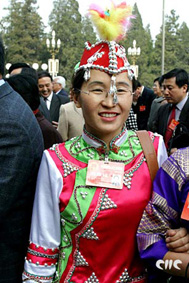
Li Zhuojuan is always decked out in gorgeous ethnic costumes when she visits Beijing, attracting shutterbugs wherever she appears. She carries herself with elegance and grace, but feels the weight of the task her colleagues and thousands of her students have placed on her shoulders.
The 34-year-old teacher from Yunnan Province, of the Yi ethnic group, is among the youngest NPC delegates. But age and fresh looks belie the grasp she has of education at the grassroots.
"The central government should spend more money on mandatory education. The ratio of central vs local government spending should be reversed," she argues.
Li says that most of the funds for elementary and secondary schools currently come from county, town and village government budgets. Even though the central government has increased funding in recent years, it is far from enough.
"We often see reports of illegal charges by some schools and counter-measures do not seem to be effective. The bottom line is, local governments can hardly provide adequate support for basic education."
Whenever local governments find their coffers dwindling, they are tempted to cut school funding. That is why there are schools that defer salaries to teachers and invent miscellaneous fees to make up for the shortfall, she complains.
She adds that her school is lucky because Jingdong County, where she works, makes an effort to pay school teachers even when it is on a tight budget.
"We've never been owed back pay," she says and is proud of the quality of her school, Jingdong No 1 High School, from which 80-90 percent of graduates are admitted to colleges.
"If the central government is responsible for the payroll of all public schools, the foundation of basic education such as the nine-year compulsory education will be solid. Schools and local governments can take care of other things like funding new facilities," she says.
The consequences of under funding in poverty-stricken areas are visible: Some students discontinue their education before the ninth year at the end of junior high, and many more quit in senior high school.
Parents in poor or remote regions don't see much hope in schooling, she explains, because education can no longer guarantee employment. "For some families, a penny earned today puts food on the table."
For those who can afford going to school, it can be a backbreaking experience. Li reveals that, before she embarked on her journey to Beijing, her students wanted her to convey their complaints: School workload has become a heavy burden for them.
The same pressure also falls on teachers, she adds. "We are like babysitters. We have to make sure that every student is kept away from harm."
One way of ensuring that is the psychological health of high-school students, for which Li Zhuojuan is preparing a proposal for the legislature.
"Obsession with the Internet, low tolerance for frustration, loss of respect for elders and other traditional values -- things like these have revealed that our students do not possess the resilience to get ahead in a competitive society," she illustrates.
(China Daily March 10, 2005)
|

